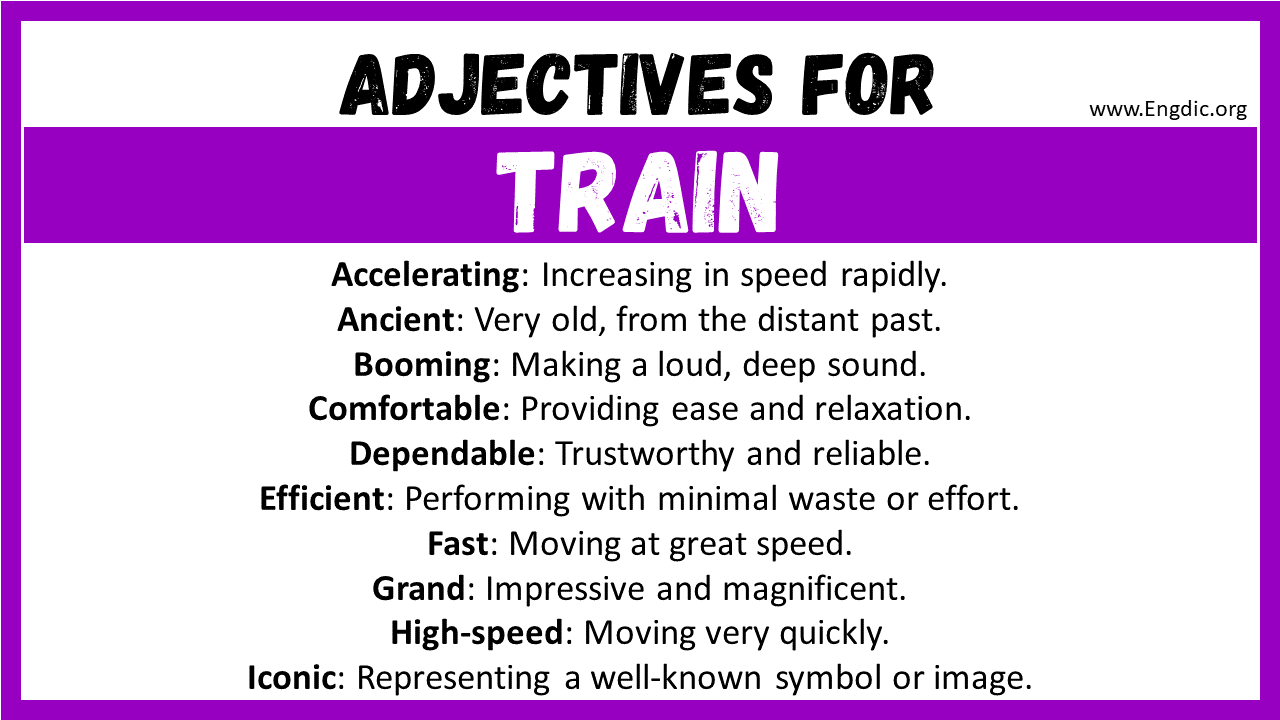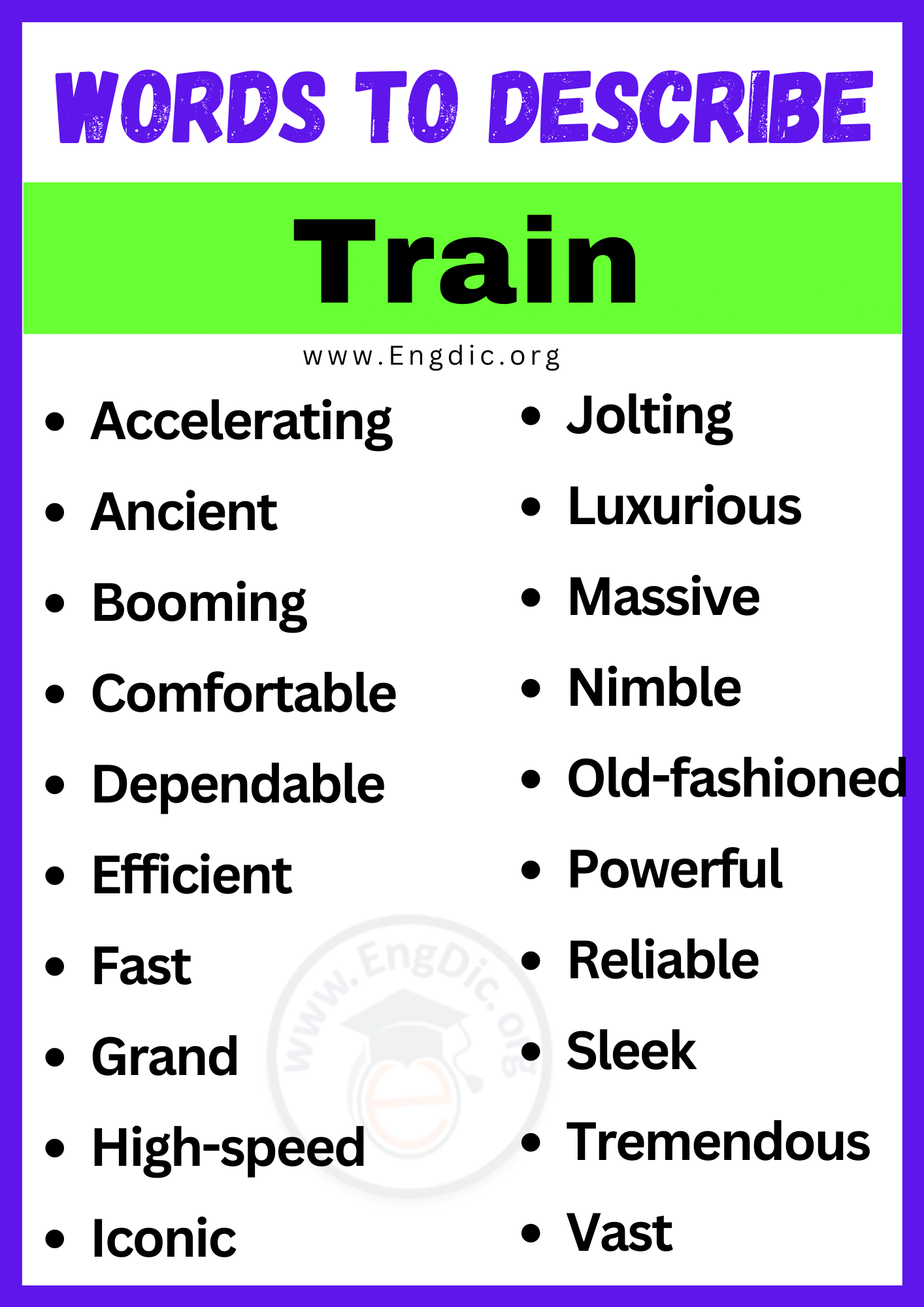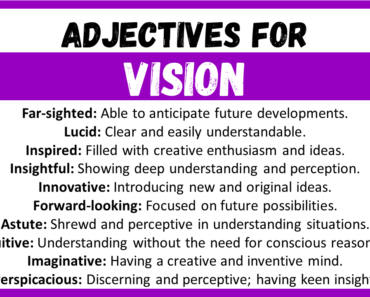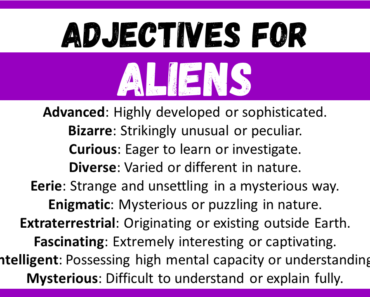Trains, the versatile mode of transportation that has connected communities and nations for centuries, are a fascinating subject of discussion. Describing a train encompasses a diverse range of adjectives that capture its essence and impact. From “mighty” when referencing the sheer power of locomotives to “relentless” as they conquer vast distances with unwavering determination, words to describe trains paint a vivid picture of these steel giants in motion. Let’s embark on a journey through the language that best defines the incredible world of trains!
Adjectives for Train
Here are the 20 Most Popular adjectives for the train:
- Accelerating
- Ancient
- Booming
- Comfortable
- Dependable
- Efficient
- Fast
- Grand
- High-speed
- Iconic
- Jolting
- Luxurious
- Massive
- Nimble
- Old-fashioned
- Powerful
- Reliable
- Sleek
- Tremendous
- Vast
Adjectives for train tracks:
- Straight
- Curved
- Well-maintained
- Rusty
- Expansive
- Interconnected
- Elevated
- Parallel
- Gleaming
- Endless
Adjectives for moving train:
- Speeding
- Graceful
- Thundering
- Swift
- Synchronized
- Unstoppable
- Rumbling
- Whirring
- Gliding
- Dynamic
Adjectives for train station:
- Busy
- Bustling
- Modern
- Crowded
- Welcoming
- Historic
- Functional
- Vibrant
- Sprawling
- Efficient
Adjectives for train sounds:
- Rattling
- Clanking
- Melodic
- Echoing
- Pulsating
- Chugging
- Whistling
- Harmonious
- Eerie
- Resonant
Adjectives for train journey:
- Scenic
- Adventurous
- Serene
- Memorable
- Exhilarating
- Smooth
- Transcendent
- Captivating
- Timeless
- Transformative
Words to Describe Train with Meanings
- Accelerating: Increasing in speed rapidly.
- Ancient: Very old, from the distant past.
- Booming: Making a loud, deep sound.
- Comfortable: Providing ease and relaxation.
- Dependable: Trustworthy and reliable.
- Efficient: Performing with minimal waste or effort.
- Fast: Moving at great speed.
- Grand: Impressive and magnificent.
- High-speed: Moving very quickly.
- Iconic: Representing a well-known symbol or image.
- Jolting: Sudden, rough movements or shocks.
- Luxurious: Extremely comfortable and elegant.
- Massive: Enormous in size or quantity.
- Nimble: Quick and light in movement.
- Old-fashioned: Outdated or traditional in style.
- Powerful: Having great strength or influence.
- Reliable: Consistently trustworthy and dependable.
- Sleek: Smooth and stylish in appearance.
- Tremendous: Extremely large or significant.
- Vast: Enormous in size or extent.
Example Sentences for Train Adjectives
- The accelerating train raced through the countryside.
- Archaeologists discovered an ancient train track.
- The explosion created a booming sound.
- The first-class cabin was incredibly comfortable.
- The dependable train arrived right on schedule.
- Solar energy is an efficient solution for trains.
- The fast train quickly reached its destination.
- The palace displayed a grand collection of trains.
- The high-speed train revolutionized travel in the region.
- The iconic steam engine attracted many enthusiasts.
- The sudden stop caused a jolting sensation.
- The luxurious dining car served gourmet meals.
- The massive engine powered through the mountains.
- The nimble train easily weaved through traffic.
- Vintage enthusiasts enjoy riding old-fashioned trains.
- The powerful locomotive pulled a long line of cars.
- The Swiss railways are known for their reliable service.
- The new high-speed train had a sleek design.
- The earthquake caused tremendous damage to the tracks.
- The train network covered a vast expanse of the country.
Explore More Words:
Words to Describe Transportation
FAQ’s
How to describe train in writing?
In writing, trains can be described as powerful, moving machines that traverse designated tracks, connecting distant places with efficiency and speed.
Is train a verb or adjective?
“Train” can be both a verb and a noun. As a verb, it means to educate or prepare someone for a particular skill or task. As a noun, it refers to a mode of transportation on rails.
How do you use the train in a sentence?
“We took the train to the city.” (noun)








